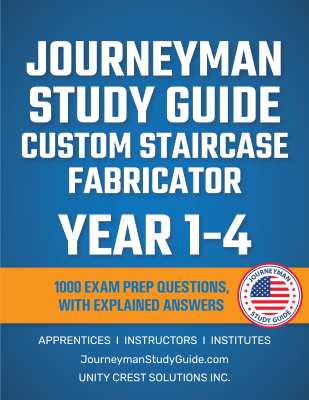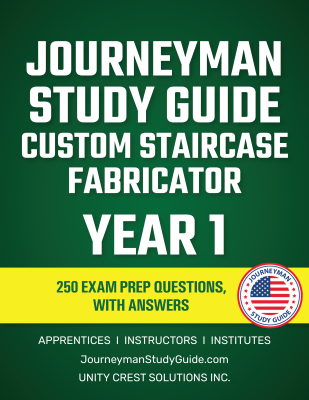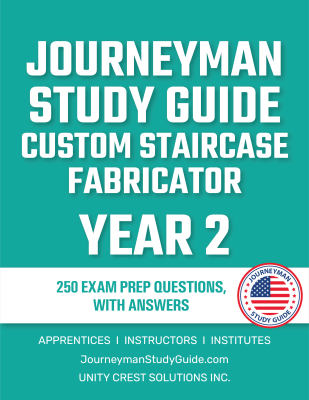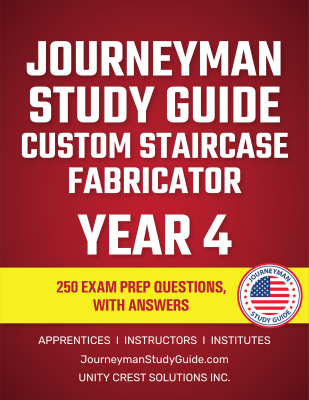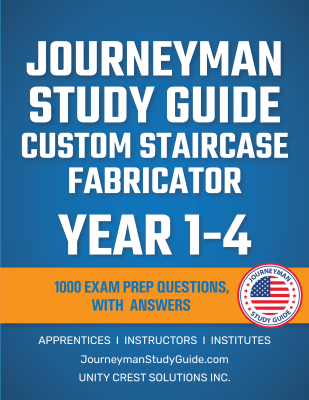Questions, Answers, & Explanations
Get clear explanations behind every answer, perfect for deeper learning and more thorough exam preparation.
Site Updates in Progress: Things might look different as we work on enhancing your experience.
What is a Custom Staircase Fabricator?
Custom staircase fabricators design, build, and install unique staircases for residential, commercial, and industrial properties. These professionals work with wood, metal, glass, and composite materials to create structures that are both functional and visually stunning. Their work requires a deep understanding of structural integrity, safety regulations, and architectural aesthetics to ensure durability and compliance with building codes.
Key Responsibilities
Custom staircase fabricators must possess technical skill, design expertise, and precision craftsmanship to complete high-quality installations:
Skills and Traits for Success
A skilled staircase fabricator must combine engineering knowledge, craftsmanship, and problem-solving abilities:
Industries Where Custom Staircase Fabricators Thrive
Custom staircase fabricators are in demand across residential, commercial, and industrial markets:
Why Choose This Career?
A career as a custom staircase fabricator offers strong job security, creative fulfillment, and excellent earning potential:
Get Certified and Advance Your Career
Proper training in metal fabrication, woodworking, and safety compliance is essential for success in this trade. Our Q&A study materials, online tests, and certification prep guides provide the knowledge needed to excel in custom staircase fabrication.
What to Expect on the Custom Staircase Fabricator Certification Exam
The Custom Staircase Fabricator Certification Exam evaluates a candidate’s knowledge of staircase construction, metalworking, woodworking, and safety standards. Many employers, architectural firms, high-end home builders, and commercial construction companies require certification to ensure fabricators meet OSHA regulations, industry standards, and engineering specifications.
Exam Format
The certification exam consists of multiple-choice and practical application questions covering:
Key Topics Covered
Passing Requirements
Most certifying bodies require a minimum score of 70% to pass. Some programs also include a hands-on skills assessment, where candidates demonstrate their ability to construct and install a staircase safely and accurately.
Prepare with Confidence
Our Q&A study materials and interactive online tests help candidates reinforce key concepts, practice fabrication techniques, and improve test performance.
What Types of Questions Are on the Exam?
The Custom Staircase Fabricator Certification Exam tests knowledge of fabrication techniques, safety standards, and material selection. Understanding the format will help ensure success.
Common Question Formats
Sample Questions
Study Smarter, Pass Faster
Our Q&A products help candidates focus on critical topics, while our Q/A Explanation guides provide deeper understanding. Our Online Tests simulate exam conditions for real-time assessment.
What Is It Like to Work as a Custom Staircase Fabricator?
A custom staircase fabricator’s workday is a blend of design, precision craftsmanship, and physical labor. Each day involves measuring, cutting, assembling, and installing staircases while ensuring compliance with safety standards and architectural requirements.
Morning: Planning and Preparation
Midday: Fabrication and Installation
Afternoon: Finishing Touches and Client Review
Challenges & Rewards
Ready to Start Your Career?
Prepare for certification with our Q&A products, online tests, and study guides designed to help you master fabrication techniques and industry regulations.
What Are the Long-Term Benefits of a Career as a Custom Staircase Fabricator?
This trade offers high demand, strong earnings, and career growth opportunities. Fabricators can specialize in ornamental metalwork, floating staircases, or industrial installations.
Career Progression
Top Employers & Career Opportunities
Union & Certification Benefits
Why This Career Matters
Custom staircases are integral to luxury homes, corporate offices, and industrial projects, requiring a blend of technical skill and artistic craftsmanship.
Take the Next Step
Advance your career with our study guides, Q&A materials, and interactive online tests tailored for custom staircase fabricators.
How Much Can You Earn as a Custom Staircase Fabricator?
Custom staircase fabricators earn competitive wages based on experience, location, specialization, and employer type. Highly skilled professionals working with luxury homes and architectural firms command top pay.
Wage Breakdown by Experience Level
Factors That Impact Earnings
Maximize Your Earning Potential
Advance your career with our Q&A study materials, certification prep courses, and interactive online tests to enhance your knowledge and improve job prospects.
Essential Tools for Custom Staircase Fabricators
Fabricators rely on precision tools, welding equipment, and high-quality materials to build structurally sound and aesthetically appealing staircases.
Must-Have Tools for the Job
Top U.S. Suppliers for Fabrication Equipment
Recommended Training & Certification Programs
Why the Right Tools & Training Matter
Using professional-grade tools and industry certifications ensures efficiency, quality craftsmanship, and long-term career success.
Get Equipped for Success
Prepare for certification with our study guides, Q&A resources, and interactive online tests tailored for custom staircase fabricators.
Where Can You Train to Become a Custom Staircase Fabricator?
Education and training programs for staircase fabricators focus on woodworking, metal fabrication, and architectural design. Many programs include hands-on training with welding, blueprint reading, and CNC machining to prepare students for real-world job demands.
Types of Training Programs
What to Expect in Training Programs
How to Choose the Right Program
Advance Your Skills with Professional Training
Becoming a certified custom staircase fabricator requires technical expertise, hands-on practice, and regulatory training. Our Q&A study materials and online tests help reinforce key concepts and prepare for certification exams.
Why Join a Union or Work with a Reputable Employer?
Union membership and employment with trusted companies provide job security, competitive wages, and career growth opportunities. Custom staircase fabricators are represented by organizations such as United Brotherhood of Carpenters (UBC) and American Institute of Steel Construction (AISC), which offer specialized training, benefits, and advocacy.
Benefits of Union Membership
Top Unions for Custom Staircase Fabricators
Leading Employers Hiring Custom Staircase Fabricators
What Employers Look For
How to Get Hired as a Custom Staircase Fabricator
Why Unions & Employers Matter
Unions and reputable employers ensure safe working conditions, competitive wages, and continuous training opportunities for custom staircase fabricators.
Secure the Best Career Opportunities
Enhance your employability by getting certified and joining a union. Use our study guides, Q&A materials, and online tests to ensure success in staircase fabrication exams.
How to Stay Ahead in the Custom Staircase Fabrication Industry
The staircase fabrication industry is evolving with advancements in materials, safety regulations, and architectural design trends. Staying competitive requires continuing education, skill development, and adaptation to modern construction techniques.
Emerging Trends in Staircase Fabrication
Best Practices for Career Growth
Challenges & Opportunities in the Industry
Staying Competitive in the Job Market
Success in the custom staircase fabrication industry depends on technical expertise, craftsmanship, and adaptability to evolving industry trends. Our Q&A materials, Q/A Explanation guides, and interactive online tests provide the knowledge and preparation needed to excel in this field.
Get clear explanations behind every answer, perfect for deeper learning and more thorough exam preparation.
Quick and easy practice to test your knowledge anytime, anywhere—ideal for simple, on-the-go preparation.





